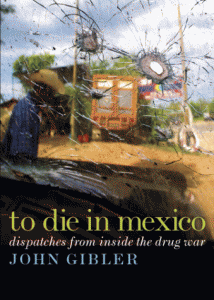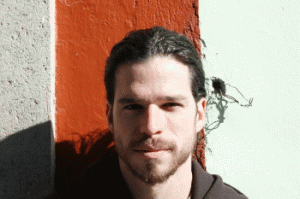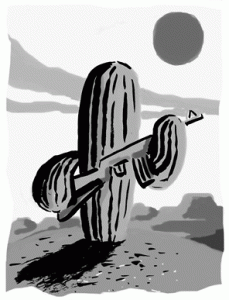 Next week, John Gibler will be celebrating the release of his new book To Die in Mexico: Dispatches from Inside the Drug War, a collection of stories about Mexico’s drug war, at City Lights bookstore in San Francisco.
Next week, John Gibler will be celebrating the release of his new book To Die in Mexico: Dispatches from Inside the Drug War, a collection of stories about Mexico’s drug war, at City Lights bookstore in San Francisco.
When: Wed, Jun 15, 2011 7:00 pm
Where: City Lights Bookstore
261 Columbus Avenue at Broadway, San Francisco
City Lights Publishers describes To Die in Mexico: Dispatches from Inside the Drug War–
Combining on the ground reporting and in-depth discussions with people on the frontlines of Mexico’s drug war, To Die in Mexico tells behind the scenes stories that address the causes and consequences of Mexico’s multibillion-dollar drug-trafficking business. Gibler tells the hair raising stories of a Mexican journalist kidnapped, interrogated and threatened with death by the Gulf Cartel before being miraculously released; family members of people killed in the conflict; survivors of assassination attempts and massacres; along with crime-beat photographers, funeral parlor workers, government officials, convicted traffickers, cab drivers and others who find themselves working against, with, or for the drug cartels. Gibler sees beyond the cops-and-robbers myths that pervade government and media portrayals of the unprecedented wave of violence and looks to the people of Mexico for solutions to the crisis now pushing Mexico to the breaking point.
 John Gibler is a writer based in Mexico and California, the author of Mexico Unconquered: Chronicles of Power and Revolt (City Lights Books, 2009), and a contributor to País de muertos: Crónicas contra la impunidad (Random House Mondadori, 2011). He is a correspondent for KPFA in San Francisco and has published in magazines in the United States and Mexico, including Left Turn, Z Magazine, Earth Island Journal, ColorLines, Race, Poverty, and the Environment, Fifth Estate, New Politics, In These Times, Yes! Magazine, Contralínea, and Milenio Semanal.
John Gibler is a writer based in Mexico and California, the author of Mexico Unconquered: Chronicles of Power and Revolt (City Lights Books, 2009), and a contributor to País de muertos: Crónicas contra la impunidad (Random House Mondadori, 2011). He is a correspondent for KPFA in San Francisco and has published in magazines in the United States and Mexico, including Left Turn, Z Magazine, Earth Island Journal, ColorLines, Race, Poverty, and the Environment, Fifth Estate, New Politics, In These Times, Yes! Magazine, Contralínea, and Milenio Semanal.
I’ve known John for many years, and I’ll say this; he is one of the most ‘committed-to-the-cause’ people I have the pleasure of knowing. He is courageous, thoughtful and driven in his efforts to raise awareness about the violence, militarization, and corruption happening in Mexico.
You can read the table of contents and opening chapter from John Gibler’s To Die in Mexico by downloading the pdf here.
To find out about where and when John Gibler will be speaking next, go here.

Pictured l to r: Ted Lewis, Javier Sicilia, and John Gibler at the 2011 Global Exchange Human Rights Awards
P.S. Last week John translated for Javier Sicilia at the Human Rights Awards where Mr. Sicilia received the People’s Choice Award for his work in building a movement to free Mexico from the spiraling violence of the ‘war on drugs.’ Check out the event recap here.

